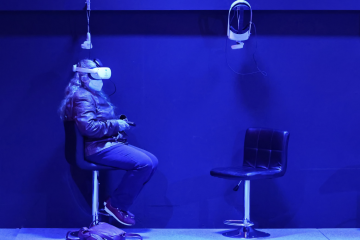Cybersex dens have increasingly taken root in the Philippines where poverty, cheap labor and an ever expanding cyber-network have led to the sexual abuse of children. It is estimated that thousands of young Filipino boys and girls are being abused by foreign men via web-cameras. According to the UN and FBI, there are up to 750,000 predators globally online at any one time.
This modern phenomenon has not been overlooked. The United States’ FBI and the Philippine’s National Bureau of Investigation (NBI) collaborate in order to locate cybersex perpetrators and entrap them. The FBI send baits to US predators, which allow them to locate cybersex dens in the Philippines. Terre des Hommes, an international Human Rights group, has also assisted in the capturing of over 1,000 online predators. In 2013, they registered a computer-animated 10-year-old Filipino girl in a bid to catch intent pedophiles. In under 10 weeks, over 20,000 pedophiles throughout the world contacted the fake account.
The PREDA foundation also plays a crucial role in helping the victims of cybercrimes. The organization runs a residential care home, whose goal is to “build up the child’s self-esteem, confidence and personal dignity… to empower them to stand for their rights and seek justice.” Fr. Shay Cullen, the founder of PREDA, and a Catholic Priest, describes his foundation’s unique ‘scream’ therapy programme which encourages children to let out their anger by screaming and beating pillows: “The children need to vent out negative emotions to regain self-confidence… It is the child who cannot cry, that is the danger.”
The pursuit of cyber criminals, however, is proving a challenge. According to Dolores Alforte, a member of the government’s Child Protection Committee, “The problem is that many cybersex enterprises are based in private homes and the police cannot raid them without a permit from the court”. The dens are also mostly found in unnumbered squatters’ settlements in dangerous and tightly organized communities, making it is extremely difficult to locate. Despite the challenges, the FBI and NBI have successfully rescued a number of victims. Lanie, lured into a cybersex den at the age of 14, was one of the lucky ones. After learning how to operate the computers, Lanie would perform for up to 15 clients a day for 7 days a week, which over a period of five months, amounts to 2,000 predators.
Of course, the huge number of online predators is a serious concern, but it is only one part of the story. 60% of the Philippine population earn less than $3 a day. Cybersex dens equipped with web-cams and sex-toys, generate between $10 and $100 per performance over the internet. Children earn in one day what their parents make in one week. While poverty does not legitimize these actions, it represents the central structural cause of the issue. Anna Santos, a Filipino journalist, states: “Cybersex is easy money, often parents are putting their children forward, some of the mothers are prostitutes themselves.” The leader of the NBI’s Anti-Trafficking Department further notes, “You can’t help feel sorry for the mother because you see how poverty has effected her”.
It has become a normalized means for young Filipino girls to earn money. Accommodating communities argue that cybersex does not represent the real abuse of children. However, penetrative sex is widespread in cybersex den’s streamed performances. Boys and girls as young as five are forced into often violent sexual acts. “Daisy’s Destruction” – a video of a tortured and raped young girl– is one such harrowing example. It sold for $1000 USD.
Cybercrime, an unexamined corollary of the internet-age, is now a multi billion-dollar industry.
It is essential that the global demand for child pornography is addressed, but steps must equally be taken to halt the rise in cybersex dens – a phenomenon inherently linked to poverty. The solution must therefore take a structural approach. The rise in poverty coupled with the emergence of cheap internet access, has resulted in an ever increasing cybercrime network throughout the Philippines.
References
Children of the Cybersex Dens
Channel News Asia
Director: Kate Blewett
Production company: MAKE Productions Pte Ltd




